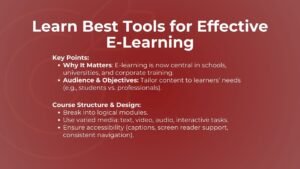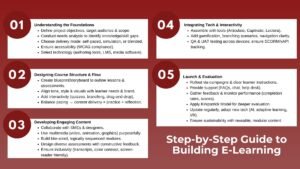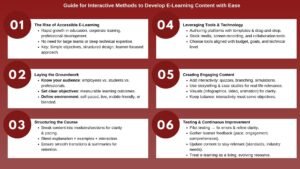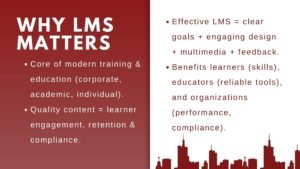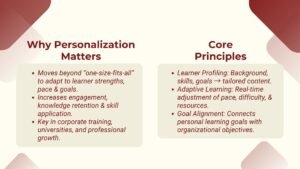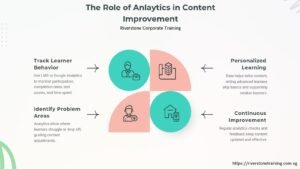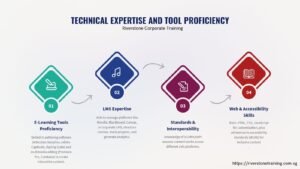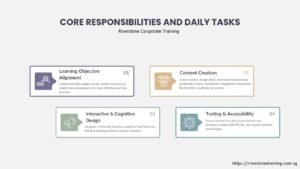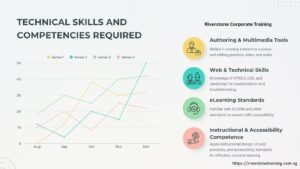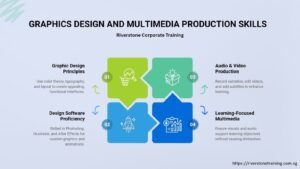
Advantage Specializing in eLearning Content Professionally
Advantage Specializing in eLearning Content Singapore Professionally
The Expanding Role of E-Learning in Modern Education and Training
Over the last two decades, the landscape of education and professional development has undergone a profound transformation. Advances in technology, widespread internet connectivity, and the shift toward remote work and learning have positioned e-learning as a primary mode of instruction for academic institutions, corporate training companies Singapore, and individual learners seeking upskilling opportunities. The demand for high-quality digital courses has grown exponentially, leading to a parallel increase in the need for skilled e-learning content specialists. These professionals combine pedagogical insight, instructional design principles, and technical expertise to create interactive, engaging, and outcome-driven learning experiences.
Specializing in e-learning content professionally requires more than simply digitizing traditional classroom materials. It involves rethinking how knowledge is structured, delivered, and assessed in an online environment. A successful e-learning content specialist must navigate the intersection of technology, education, and user experience, ensuring that learners remain motivated while achieving measurable skill improvements. In an age where learners expect flexibility, personalization, and interactivity, professionals in this field have an opportunity to shape the future of education.
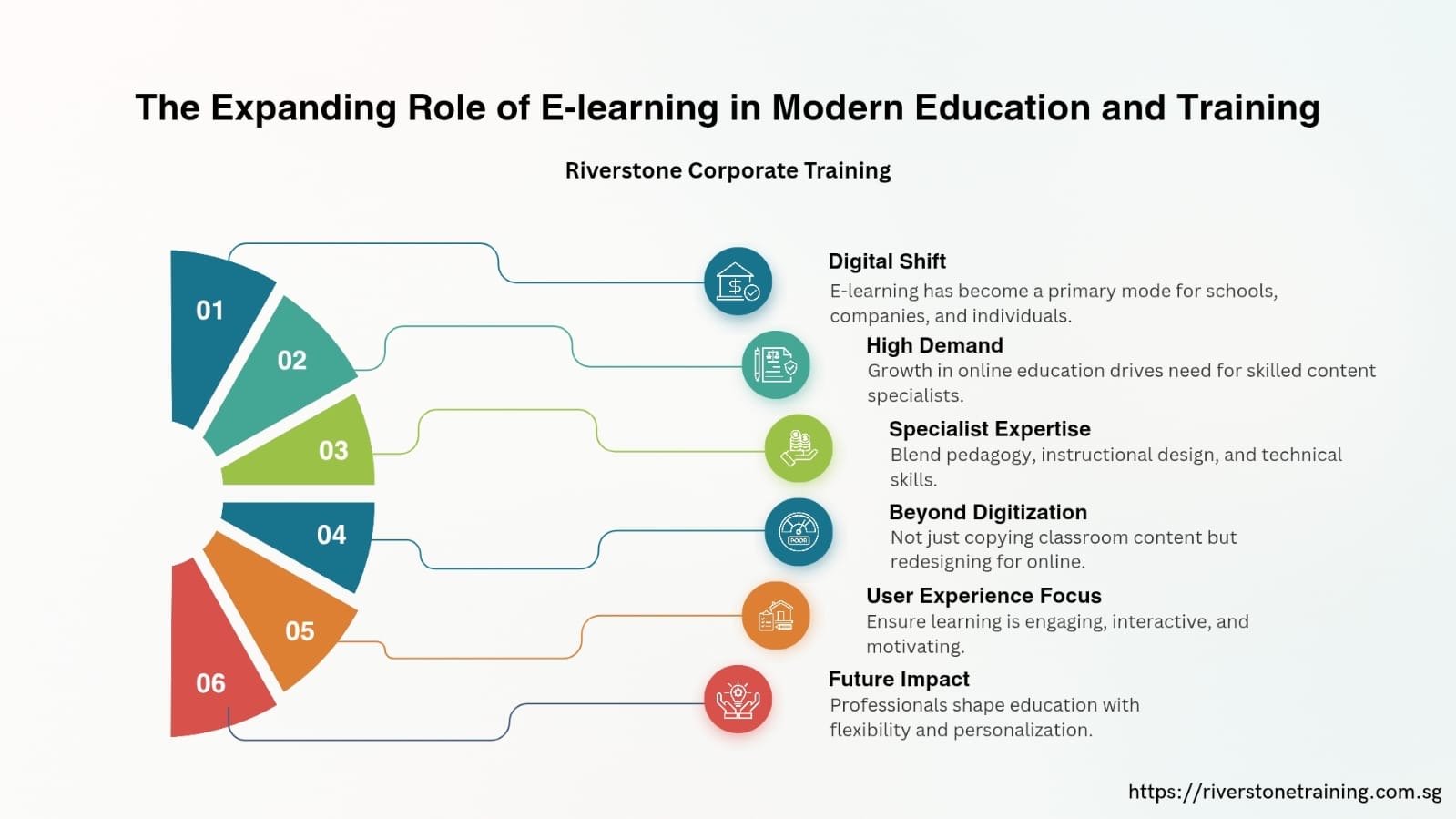
Building a Foundation: Instructional Design and Learning Theories
The cornerstone of professional e-learning content creation is a solid understanding of instructional design frameworks and learning theories. While many content creators begin with subject matter expertise, advancing into a professional role requires mastery of methodologies that optimize learning outcomes. Models such as ADDIE (Analyze, Design, Develop, Implement, Evaluate) and SAM (Successive Approximation Model) provide structured approaches to course creation, guiding designers from initial needs analysis to final evaluation.
Equally important is the ability to apply learning theories effectively. Cognitivism, constructivism, and behaviorism each offer different perspectives on how learners absorb and retain information. For instance, a course grounded in constructivist principles might emphasize problem-solving and scenario-based learning, while a behaviorist-influenced module might focus on repetition, reinforcement, and measurable performance metrics. Professionals who understand how to align course objectives with the right theoretical framework are better equipped to create content that is both engaging and pedagogically sound.
As e-learning becomes more data-driven, the integration of learning analytics into instructional design has also emerged as a critical skill. By analyzing learner performance, engagement levels, and feedback, specialists can refine content for continuous improvement. This data-informed approach ensures that e-learning programs are not static but evolve in response to learner needs and technological advancements.
Technical Expertise and Tool Proficiency
While instructional design provides the framework, technical expertise enables execution. A professional specializing in e-learning content must be proficient in the use of Learning Management Systems (LMS), authoring tools, and multimedia production software. Popular tools such as Articulate Storyline, Adobe Captivate, and iSpring Suite allow creators to design interactive modules, while video editing platforms like Adobe Premiere Pro or Camtasia enhance multimedia components.
Proficiency with LMS platforms is equally essential. Whether working with Moodle, Blackboard, Canvas, or corporate systems like SAP SuccessFactors and Cornerstone, a content specialist must know how to structure courses, integrate assessments, manage user progress, and generate analytics reports. In many professional environments, this also extends to implementing SCORM or xAPI standards to ensure interoperability between content and various LMS platforms.
Beyond tool proficiency, professionals must have a working knowledge of web development basics. Skills in HTML, CSS, and JavaScript, while not always mandatory, can be valuable for customizing course layouts, creating interactive elements, or troubleshooting compatibility issues. Understanding accessibility standards such as WCAG (Web Content Accessibility Guidelines) is also critical to ensuring that e-learning content is inclusive and compliant with legal requirements.
Content Strategy and Learner Engagement Techniques
Professional e-learning content is more than just well-structured lessons. It is a strategic blend of educational objectives, engaging narratives, and interactive experiences that maintain learner motivation. Creating a content strategy involves defining the target audience, setting measurable learning objectives, and determining the most effective delivery format.
One hallmark of professional e-learning content is the ability to sustain engagement throughout the learning journey. This is often achieved through storytelling, gamification, and scenario-based learning. Storytelling helps contextualize information, making abstract concepts more relatable and memorable. Gamification introduces elements such as points, badges, and leaderboards, encouraging active participation and healthy competition. Scenario-based learning allows learners to apply knowledge in realistic contexts, reinforcing understanding and boosting confidence.
Equally important is microlearning, an increasingly popular strategy where content is broken into short, focused modules. Professionals must recognize when this approach is appropriate, as it can improve retention and fit seamlessly into busy learners’ schedules. Combining microlearning with mobile-friendly design further enhances accessibility and user convenience, meeting the needs of a modern, on-the-go audience.
Professional Development and Career Pathways in eLearning Content Singapore
Specializing in e-learning content professionally offers diverse career opportunities across industries. Corporate training departments, higher education institutions, government agencies, non-profit organizations, and private training providers all require skilled professionals to design and manage digital learning initiatives. Common roles include instructional designer, e-learning developer, content strategist, and learning experience designer.
To remain competitive, professionals must commit to continuous learning. Emerging technologies such as artificial intelligence, augmented reality (AR), and virtual reality (VR) are redefining the possibilities of online education. By staying informed about these innovations and experimenting with their integration, specialists can future-proof their careers. Certifications from recognized organizations, such as the Association for Talent Development (ATD) or the eLearning Guild, can further validate expertise and enhance credibility in the field.
Networking and collaboration also play an essential role in professional growth. Participating in industry conferences, online forums, and webinars allows specialists to exchange insights, learn from peers, and discover new tools and methodologies. As the e-learning community is global, these connections often lead to collaborative projects and international opportunities.
The Future of Professional E-Learning Content Specialization
The future of e-learning content specialization is poised for significant evolution, driven by technological innovation, shifts in learner expectations, and the increasing need for scalable, personalized education. Artificial intelligence is already making an impact by enabling adaptive learning systems that tailor content to individual performance patterns. Similarly, immersive technologies like VR and AR are enhancing experiential learning, particularly in fields that require simulation of real-world scenarios.
Data analytics will continue to be a driving force, providing actionable insights into learner behavior, content effectiveness, and return on investment for business valuation Singapore training programs. Specialists who can interpret and act on this data will have a competitive advantage. Furthermore, as remote and hybrid learning models become standard, the demand for accessible, high-quality, and flexible e-learning content will remain strong.
Ethics and inclusivity will also shape the future of this profession. As e-learning reaches increasingly diverse global audiences, content creators must prioritize cultural sensitivity, representation, and accessibility. Ensuring that courses are designed for a wide range of learning preferences, abilities, and backgrounds will be a defining characteristic of leading professionals in the field.
Ultimately, specializing in e-learning content professionally offers a unique opportunity to combine creativity, technology, and education in ways that have a lasting impact on learners worldwide. As the digital learning environment continues to expand, those who invest in their skills, embrace innovation, and remain committed to learner success will find themselves at the forefront of one of the most dynamic and rewarding sectors in education and due diligence training Singapore.



